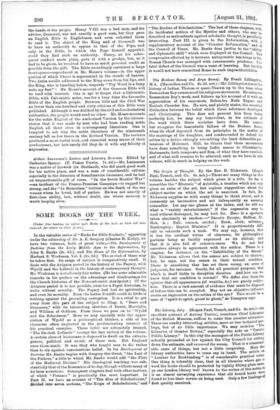SOME BOOKS OF THE WEEK.
LThatier this hooding we notice such Books of the week as have not been rteerred for review in other forms.] In the valuable series of "Books for Bible Students;' appearing under the editorship of Dr. A. E. Gregory (Charles H. Kelly), we have two volumes, both of great value,—The Development of Doctrine from the Early Middle Ages to the Reformation, by John S. Banks (2s. 6d.), and The Dawn of the Reformation, by Herbert S. Workman, Vol. I. (2s. 6d.) The second of these may be taken first. Its range of subject is comparatively small. It deals with the Avignon period in the history of the Papacy, with Wyclif and the Lollards in the history of contemporary thought. Mr. Workman is a studiously fair writer. (He has some admirable remarks in his preface on the advantage and disadvantage for the Church historian of the Nonconformist standpoint.) Of the Avignon period it is not possible, even for a Papal historian, to write without severity. The Papacy had lost its spirituality, and even its morality. Even the better Pontiffs could do little or nothing against the prevailing corruption. It is a relief to get away from this part of the subject to Chap. 2, " Seers and Dreamers," with its interesting sketches of Dante, Marsiglio, and William of Ockham. From these we pass on to " Wyclif and the Schoolmen." Here we may specially note the appre- ciation of Wyclif as a philosophical thinker, a side of his character often neglected in the predominating interest of his practical energies. These latter are adequately treated. "The Einelush Lollards" occupy the last section of the volume. A certain class of historians is disposed to dwell on the extrava- gances, political and social, of these men. But England owes them much. It was they who taught men to die rather than to sin against conscientious belief. In his Development of Doctrine Mr. Banks begins with Gregory the Great, "the Last of the Fathers," a title to which Mr. Banks would add "the First of the Mediaeval Divines." His theological teaching was sub- stantially that of the Romanism of to-day, though without many of its later accretions. Subsequent chapters deal with other matters, of which " Penance " is practically the most important. In Part II. we have an account of "The Rise of Scholasticism," divided into seven sections, "The Reign of Scholasticism," and "The Decline of Scholasticism." The last of these chapters, with its incidental notices of the Mystics and others, who may described as malcontents against scholastic thought, is peculiarly interesting. Part M. is given to the Reformation, with a supplementary account of the " Counter Reformation," and of the Council of Trent. Mr. Banks does just ioe to the "ability and diplomatic skill" which were displayed at the Council. The compromise effected by it between antagonistic teachings in the Roman Church was managed with consummate prudence. The fatal defect of the Council was a want of learning. But for this it would not have committed Rome to such impracticabilities.


































 Previous page
Previous page